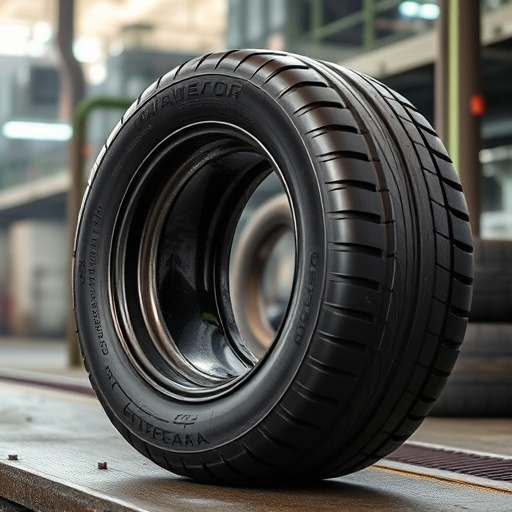
Tyre factories contribute significantly to environmental and public health issues through their rubber production processes, emitting volatile organic compounds (VOCs) like benzene, toluene, and formaldehyde, as well as particulate matter (PM2.5 and PM10). These pollutants degrade air quality and pose respiratory problems and long-term health damage. To address these challenges, tyre manufacturers are adopting emission control technologies and exploring eco-friendly production methods, such as using natural rubber sources and developing 'green tyres', to reduce their environmental footprint and mitigate industrial pollution, thereby enhancing air quality and mitigating public health concerns related to tyre pollution and VOCs.
Emissions from Tyre Factories: Unraveling the Environmental Impact
Tyre factories contribute significantly to environmental concerns, particularly in terms of air quality impact and industrial pollution. This article delves into the intricate world of rubber production, exploring how various processes generate factory emissions such as Volatile Organic Compounds (VOCs) and particulate matter. We examine the far-reaching consequences for public health and the environment, while also highlighting existing emission control measures. Additionally, we showcase the emerging trend of eco-friendly tyres and sustainable practices aimed at mitigating these adverse effects, offering a glimpse into a greener future for the industry.
- Understanding Tyre Factory Emissions: A Glimpse into Rubber Production Processes
- – Overview of rubber production and common emission sources
- – Chemical processes involved and their environmental implications
- Air Quality Impact: VOCs, Particulate Matter, and Their Health Consequences
Understanding Tyre Factory Emissions: A Glimpse into Rubber Production Processes

Tyre factories, amidst their rubber production processes, emit a cocktail of pollutants into the air and environment, contributing to various health risks and environmental concerns. The primary culprits are Volatile Organic Compounds (VOCs) and Particulate Matter (PM), both of which have significant air quality impacts. VOCs, including benzene, toluene, and formaldehyde, are released during rubber compounding and curing processes. These compounds not only degrade air quality but also pose risks to human health, potentially causing respiratory issues and long-term health problems.
Particulate Matter, a mix of fine particles from various sources like rubber dust and exhaust gases, is another critical issue. PM2.5 and PM10, in particular, can penetrate deep into the respiratory system, leading to acute and chronic respiratory diseases. To mitigate these issues, tyre manufacturers are increasingly adopting emission control technologies and exploring eco-friendly production methods, such as using natural rubber sources and developing green tyres, to reduce their environmental footprint.
– Overview of rubber production and common emission sources

Rubber production is a complex process that involves extracting natural latex from rubber trees or synthesizing it through chemical reactions. This raw material is then processed, mixed with various additives, and molded into different forms, including the familiar tyre components. While this industry has evolved to meet growing global demand, it also presents significant environmental challenges due to its production methods. Common emission sources associated with rubber manufacturing include volatile organic compounds (VOCs), which can contribute to both air quality impact and the formation of particulate matter.
Tyre factories, in particular, release a range of pollutants into the atmosphere, including VOCs such as benzene and toluene, as well as particulate matter resulting from tyre curing and grinding processes. These emissions have been linked to various health risks for nearby communities, including respiratory issues and other cardiovascular problems. However, there is a growing trend towards eco-friendly tyres, which employ innovative emission control technologies and sustainable production methods to minimize their environmental footprint, thereby improving air quality and public health outcomes.
– Chemical processes involved and their environmental implications

The chemical processes involved in tyre manufacturing have significant environmental implications. During rubber production, various volatile organic compounds (VOCs) are released into the air as byproducts. These VOCs contribute to smog formation and negatively impact air quality, leading to respiratory issues and other health risks for nearby communities. Additionally, the burning of fossil fuels and raw materials in the manufacturing process releases particulate matter, another harmful component that can penetrate deep into the lungs, exacerbating cardiovascular and lung diseases.
Factory emissions from tyre production also include toxic metals and heavy substances that contaminate water sources and soil if not properly managed. To mitigate these issues, industries are increasingly adopting emission control technologies and focusing on eco-friendly tyres. Innovations in rubber compounding and production methods aim to reduce VOCs and particulate matter emissions while promoting sustainable practices throughout the manufacturing process.
Air Quality Impact: VOCs, Particulate Matter, and Their Health Consequences

Tyre factories contribute significantly to air pollution through their factory emissions, especially in terms of volatile organic compounds (VOCs) and particulate matter. During rubber production, various organic compounds are released into the atmosphere as VOCs, which can include benzene, toluene, and xylene—known carcinogens and respiratory irritants. These chemicals not only deteriorate air quality but also pose severe health risks to nearby communities.
Particulate matter, another major concern, refers to tiny particles of solid or liquid suspended in the air. Tyre factories emit fine dust, including black carbon, which can penetrate deep into the lungs. Long-term exposure to these particulate matters has been linked to respiratory diseases, cardiovascular issues, and even premature death. As the global demand for tyres continues to rise, it is crucial to implement effective emission control measures to mitigate industrial pollution and promote eco-friendly tyre production processes that minimise both tyre pollution and the subsequent air quality impact.
The rubber production process in tyre factories generates significant industrial pollution, contributing to both air quality impact and health risks. Volatile Organic Compounds (VOCs) and Particulate Matter (PM) are primary pollutants released during rubber manufacturing, exacerbating environmental issues such as smog and climate change. However, the shift towards eco-friendly tyres and stringent emission control measures offers a path to mitigation. By adopting advanced production techniques and sustainable practices, the tyre industry can reduce its environmental footprint, ensuring both quality products and a healthier planet.





